Breaking News: At least 10 feared to have drowned in Makueni river
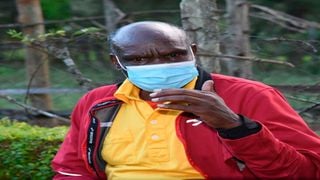
Legendary athlete Henry Rono gestures during an interview with Nation Sport at his home in Kaptargon village, Nandi County on April 7, 2021.
| Jared Nyataya | Nation Media GroupHenry Rono: ‘Nandi Warrior’ struggling to get his life back on track
What you need to know:
- The last time I’d physically met with Rono was just over 10 years ago in November, 2008, at the opulent Fairmont Hotel Monte Carlo in Monaco on the sidelines of the IAAF Gala where he was awarded the 2008 Inspiration Award by the world athletics governing body for his contribution to the sport.
On December 31, 2018, I saw a missed call from Kenya’s athletics legend Henry Rono.
It was from Albuquerque, New Mexico.
For some reason – largely due to the New Year’s Day festivities – calling him back escaped my mind.
Two weeks later, Rono dropped me a message.
“Hi Elias, how are You?”, he wrote.
“Hi Henry. I’m fine, thanks. I hope you are well, Sir?”, I answered, but Rono didn’t immediately respond.
His next message on January 21, 2019, sounded quite desperate.
“Elias talk to my wife and make arrangements for me to come home to Kenya, please?”
It then struck me that the 69-year-old legend who, in 1978, shattered four world distance records inside just 81 days, had indeed come to the end of his tether.
The legend, famously referred to as “The Nandi Warrior,” could fight no more.
And from his odd request, I could also decipher that his family life wasn’t quite together.
Our conversation continued, and confirmed my fears.
He had little contact with his wife in Kenya, Jennifer, and their two children, Calvin and Maureen.
“Hi Henry. You are a legend and the government can also help you come back. Would you like me to ask the government to assist you? What exactly is the problem?” I posed.
“Yes, I would like the government to help me get back home, with (buying) a ticket. That’s exactly what I want. I cannot afford living in the USA anymore. I’m getting old… also, over 32 years is too long,” he responded.
I was aware of Rono’s tribulations, but didn’t know that he’d given up on living in USA altogether.
Rono first landed in USA in 1976 when he won an athletics scholarship to the Washington State University after a meteoric rise in distance running.
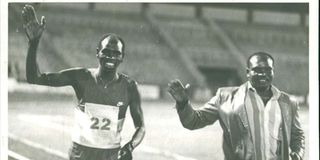
Mike Boit (left) salutes fans accompanied by World 3,000 metres champion Henry Rono after finishing fourth in the 1,500 metres race during the Mike Boit Classic at Nyayo National Stadium in this photo taken in 1985.
He travelled back and forth to Kenya, but for 33 years, he hadn’t stepped back in his homeland until his final return in November, 2019.
I sought to know just what went wrong, because I always knew that he shifted into coaching and teaching, after winning his battle against alcoholism.
“I did retire from coaching, but other jobs are stressful and I’m too old…” he explained at the time.
“Like now, I’m sick from working hard… many of my fellow Kenyans are dying from stressful hard working jobs here… I don’t coach. I work at the airport security.”
The last time I’d physically met with Rono was just over 10 years ago in November, 2008, at the opulent Fairmont Hotel Monte Carlo in Monaco on the sidelines of the IAAF Gala where he was awarded the 2008 Inspiration Award by the world athletics governing body for his contribution to the sport.
I reminded him of our meeting in the principality.
“I have been given another award in Belgrade, but I’m unable to attend because of the stressful working conditions…. like now, I’m in the bed,” he responded.
Rich Dafter, a retired athlete and now coach, helped put together Rono’s journey back to Kenya, in partnership with some members of the Kenyan community in USA, principally Peter Njagi, a graduate teaching assistant at the University of New Mexico, and Gladys Wetende.
Crumbling fortunes
Dafter had known Rono for over 15 years and was concerned about the legend’s crumbling fortunes.
“I think that Henry's situation is desperate and he needs to go home,” Dafter told me on January 22, 2019.
“His situation is never what he says it is and we don't want him to be an old man who is homeless... Henry needs one plane ticket and he needs it ASAP. That is my opinion.”
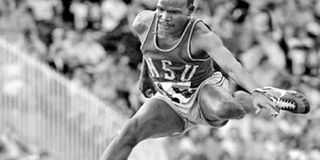
Kenyan distance running legend Henry Rono.
Dafter explained that Rono was bitter, and that he wouldn’t like to see the “Nandi Warrior” self-destruct.
“We go to Calvary Albuquerque and our pastor is a world class Bible teacher. His radio message today was about bitterness,” he explained.
“If in the past, and I am saying ‘if’ because I have only known Henry for about 15 years, he was angry or bitter, then he needs to forgive and forget and put the past in the past.
“It is so very unhealthy to hold onto negative emotions and not take ownership of your life. He is a great man inside and I want him to channel his greatness for good now.
“He has a Nandi warrior heart and his mind wants to be able to direct his body to do what it does best.
“Elias, it is like a person who has served in the military and ends up being homeless because we haven't respected their service to their country,” Dafter continued.
“He electrified the running world with his accomplishments and we need to always remember that.
“Had he left college and become a successful businessman, his picture would be in a hall of fame and he would be still recognised for his greatness.
“Yes, I will always stand by Henry. We need to get him back on his feet and help him to stand tall again like he was in this picture of him that I have in my house.”
Last week on Wednesday, accompanied by colleagues Jared Nyataya, Steve Keter and Bernard Rotich, we visited Rono where it all began, at Kiptaragon Village in Nandi County, from where the legend launched his athletics career, running to and from his Kabirirsang Primary School in the late 1950s.
“Just drive on and keep right,” a boda boda rider tells us at the main Kabirirsang market, on the junction where one road leads to the AIC Kiptaragon Academy and St George Kabirirsang Catholic Church.
About two kilometres down the road, a black meshed gate led us into a well tended homestead where we are welcomed by Eunice Meli, Rono’s sister-in-law.
Moments later, just as we settled down, a masked-up Rono emerged from the back lawn of the bungalow, cutting a forlorn figure as he trudged to the front garden.
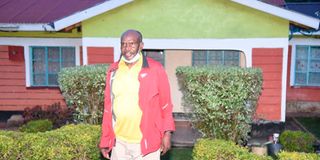
Legendary athlete Henry Rono, who broke four World Records when he was an active athlete, stands outside his house during an interview with Nation Sport at his home in Kaptargon village, Nandi County on April 7, 2021.
As he welcomed us, I noticed inscriptions on the back of his maroon Saucony jacket highlighting his four world records:
“World Records:
10,000m: 27.22.5;
5,000m: 13.08.04;
3,000m steeplechase: 8.05.4
3,000m: 7.32.1”
An invaluable souvenir.
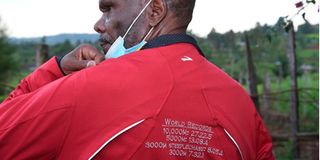
Legendary athlete Henry Rono, shows the four world records he broke emblazoned on his jacket during an interview with Nation Sport at his home in Kaptargon village, Nandi County on April 7, 2021.
“Karibuni. This is where he I am,” he invited us as we quickly settled down for the interview as it was heading to 5pm.
It quickly emerged that reality had dawned on the legend that, after all, life back home wouldn’t be as comfortable as he’d wished.
A case of jumping from frying pan into fire?
Not exactly.
He appeared quite healthy and seems to have put on a few kilos since his return to Kenya on November 21, 2019, after 33 straight years abroad.
But he’s bitter over the fact that since his return, he’s been unable to have meaningful work to do, having to spend idle days in his brother’s home.

Legendary athlete Henry Rono, who broke four world records when he was an active athlete, speaks during an interview with Nation Sport at his home in Kaptargon village, Nandi County on April 7, 2021.
Lost control of his possessions
Rono seems to have lost control of his possessions, which include 100 acres of land in Molo and a home in Nairobi.
“This is where I was born,” he says after we settle down on a bench in the shade.
“This is Kiptaragon, and this is where I started running while in primary school at Kabirirsang.”
Rono spent four years in Gilgil having joined the army in 1973, making the Kenyan team to the 1976 Olympic Games in Montreal, Canada.
But Kenya was among 25 African countries that boycotted the Montreal Games, protesting against New Zealand’s sporting links with apartheid South Africa after the International Olympic Committee failed to bar the Kiwis from Montreal.
Four years later, Kenya again boycotted the Olympics in Moscow, this time joining protests against the Soviet Union’s invasion of Afghanistan.
This meant that Rono would go down in history as probably the best ever athlete never to have competed at the Olympics.
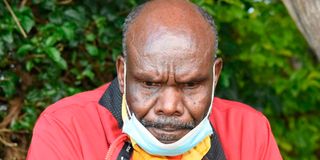
Legendary athlete Henry Rono, who broke four world records when he was an active athlete, during an interview with Nation Sport at his home in Kaptargon village, Nandi County on April 7, 2021.
So good was his form that in 1978, he shattered four world records inside just 81 days, namely seven minutes, 32.1 seconds in the 3,000 metres in Oslo, 5,000m (13:08.4, in Berkeley, USA), 10,000m (27:22.47 in Vienna, Austria) and 3,000m steeplechase (8:05.4 in Seattle, USA).
He later improved his 5,000m world record, running 13:06.20 in Knarvik, Norway, in 1981.
“It was sad that I missed the ’76 and ’80 Olympics when I was in top shape,” he reminisced last week, alleging that he was a victim of his own success.
“That was quite discouraging, along with a lot of other things that affected my running, including the administration of Kenyan athletics at the time which was also distracting my running and pulling me off the track…
“My running had a lot of frustrations. I was performing well and people could not take it and the best way for them was to pull me off the track.”
Proper planning
He attributes his world record blitz to “proper planning” and unique training methods.
“My running was well-planned, and going to USA was part of the plan to break these records in those local meets.
“It was an opportunity for me to have time to run without distractions… people were even wondering why I was breaking world records at small meets in the US and not at big meetings.
“I could see ahead that they could not allow me to run a big race. When they sensed that I was going to break a world record, that’s the time they would pull me off the track.
“The world records came because I would train at a certain level that nobody else could reach.
“So for me to break world records wasn’t a problem, and when I figured out I won’t go to the Olympics that’s when I decided to break them at local meets.”
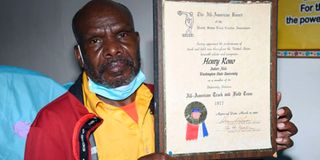
Legendary athlete Henry Rono, who broke four World Records when he was an active athlete, displays a recognition certificate he was given in 1977, during an interview with Nation Sport at his home in Kaptargon village, Nandi County on April 7, 2021.
It was at the height of his stardom that Rono fell into alcoholism, spending as much as he earned from the track, or more, on booze.
That’s the only way, it seems, he could handle the pressure that comes with being a track star.
Rono had so much money circulating around him and it was reported widely that four banks – including Citizen’s Bank and Oritani Savings and Loan – accused him of defrauding them of $1,300, a tidy sum at the time.
He was arrested on November 13, 1986, at a branch of Oritani Savings and Loan after a teller claimed to have positively identified him as the man who defrauded one of the bank’s branches.
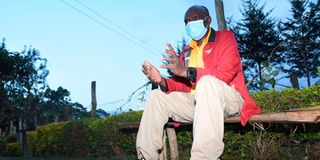
Legendary athlete Henry Rono, who broke four World Records when he was an active athlete, during an interview with Nation Sport at his home in Kaptargon village, Nandi County on April 7, 2021.
This was after he had been fined $860 and placed on a year’s probation after an altercation with a bar tender.
Rono spent five days in a Bergen County prison in New Jersey.
His lawyer Merrill Rubin fought his case until he was released on May 27, 1987, after the charges were dropped, with the judge ruling it was a case of mistaken identity.
He still doesn’t want to blame his tribulations on alcohol, saying it all boiled down to jealousy and “racism.”
“No, the alcohol problem came much later... No one could drink alcohol and train and then break world records,” he argues.
“People were frustrating me because of the talent I had. No one had that level of running. What I figured out is that it was also about racism.
“Running was easy for me because of the training I was doing and when I made it look easy, people hated that – they wondered that I was not interested in money and I was just interested in breaking records.
“They could not buy me so they had to find a way of frustrating me.”
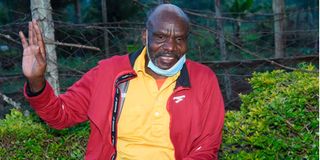
Legendary athlete Henry Rono, who broke four World Records when he was an active athlete, explains a point during an interview with Nation Sport at his home in Kaptargon village, Nandi County on April 7, 2021.
He attributes his incidents with the banks as part of the racist tirade and efforts by his agent then, Tracy Sundlun, to force him into rehab.
“I’m not a bank robber. It was mistaken identity.
“I’d walked away from my agent and the only way they could catch me was to accuse me of something and then put me into a rehab programme.
“When I told them that I need to be independent, and that I didn't need an agent, they gave me my money and I went into the bank, and that’s when I was arrested and they accused me of robbing the bank – that was the only way they could get me by force to get into rehab.”
From November, 1986, until 2015, Rono was in rehab programmes until he was able to shake off alcoholism, subsequently taking up odd jobs to make ends meet, including pushing luggage trolleys at an Albuquerque airport.
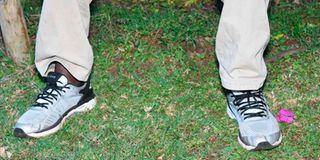
Asics shoes won by the legendary Henry Rono, who broke four World Records when he was an active athlete, during an interview with Nation Sport at his home in Kaptargon village, Nandi County on April 7, 2021.
It was then that the push to have him return to Kenya was launched.
But since his arrival in November, 2019, the numerous promises made to offer the “Nandi Warrior” mentorship and coaching jobs in his home county of Nandi haven’t been honoured.
But he’s taking it in his stride, currently living with his younger brother, David Meli, who opted to take him in after his wife and children kept a distance.
“He’s my brother after all, and the least I could do is take him in,” Meli said on Saturday.
“But he needs help, especially medical, because doctors say he seems to be suffering from long-term effects of living in a polluted surrounding,” Meli added.
“Medical diagnosis indicate that he has a heart condition and problems with pressure associated with the pollution. We will be grateful for any help.”

Legendary athlete Henry Rono gestures during an interview with Nation Sport at his home in Kaptargon village, Nandi County on April 7, 2021.
At Washington State University, Rono graduated with a bachelor’s degree in general studies and feels he can still make a contribution to athletics, rather than lounge in his brother’s home.
“I don’t expect to be given anything. What I learnt in rehab is that one must learn how to be yourself and not to expect anything from people,” he says.
“Because if you expect something, you will get into relapse and back into alcoholism again. You have to be yourself and be careful about what you expect because you may never get it.”
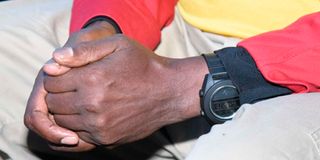
The wrist watch worn by Henry Rono during an interview with Nation Sport at his home in Kaptargon village, Nandi County on April 7, 2021.
Rono says he bought 100 acres of land in 1979 in Molo at the height of his athletics prowess and maintains the land is intact although unconfirmed reports indicate that he could have lost the land and other property during his stay in USA.
But he confirms that while battling his drinking problem, he was disconnected from his wife Jennifer and children.
“All these (rehab) problems I was going through became a disconnection. My family could not understand how an alcoholic person could go into rehab after rehab.
“There’s no way I could explain. The only thing was to control myself because I could not make them understand what I was going through.
“The only people who understand are those who have visited the rehab to see what one of their own was going through in rehab.
“For 30 years, I was going to rehab and prayer meetings and I would meet all the families of alcoholic people, but my family wasn’t there and they were in Kenya so I was on my own.”
Rono is still struggling to reconnect with his Kiptaragon home, with most of his peers having passed on and many promises made to him unfulfilled.
“You have to realise that in Kenya, many promises are not kept,” he reflects.
“In Kenya, you should not expect someone to give you anything. You have to work for it. And you cannot sit and wait…
“For instance, if I was depending on the government to give me land, I’d be homeless now.”
Rono says he was inspired to take up professional running so that he could tour the world.
During his days, there weren’t too many athlete agents and he had to negotiate his appearances personally.
“I knew that running would take me all over the world. I know that if you succeed, then you can go anywhere and get what you want.”
He argues that university scholarships weren’t as rosy as they appeared, and that these institutions exploited talented athletes.
“You can go to college without paying fees, because they want to use your name. That’s all they wanted.
“I didn’t have to be smart… All they (Washington State University) wanted was to use my name to promote the university.”
He confessed that he gathered little, academically speaking, from his studies at WSU.
“The only education I know I got was when I went out of university into community college.
“University was just a place to get a name for the university so that they recruit more athletes… it was more like exploitation - to use athletes to promote the name of the university.”
Rono says he has been sober for the last six years now, after leaving rehab for the last time in 2015.
“Life was difficult and that’s why I went into full-time drinking. But they realised I was not into alcohol, and was only using alcohol just to escape from frustrations.
“There was high demand on me from sports, and managers wanted to manage my running for their own selfish reasons.
“And that’s part of the reason why athletes in Kenya are getting into using drugs and banned performance-enhancing substances,” he reflected.

Legendary athlete Henry Rono, who broke four world records when he was an active athlete, speaks during an interview with Nation Sport at his home in Kaptargon village, Nandi County on April 7, 2021.
Athletics Kenya President Jack Tuwei, Nandi County Sports Officer Kennedy Tanui and marathon legend Moses Tanui all agree that it needs a concerted effort to assist Rono and other Kenyan legends.
Even those who may have made unwise life decisions.
“Rono has been away for a long time and he needs a lot of encouragement and support,” Tuwei said on Saturday.
“Athletics Kenya is looking at ways of helping him and other legends, but even then, it should be a collective effort and county governments need to also help, as these legends are their own and live within their counties,” he added.
Kennedy Tanui assured that in the next financial year, the County Government of Nandi will allocate funds to extend a lifeline to Rono and other legends.
“We will engage Rono and others on consultancy basis to talk to and mentor the young athletes. Finances have been a major issue in the counties, but we shall make necessary arrangements in the next financial year from June.
“We bought Rono the tickets back home, and we also appeal to corporates and successful retired athletes to join us in cushioning these legends,” he adds.
Two-time Boston Marathon champion Moses Tanui maintains that an athletes’ welfare fund is the best way forward.
“Unfortunately, with the politics in sports, we can’t do much. We have tried before to form a welfare group but the idea was shot down due to politics,” Tanui, the first man to run a sub one-hour half marathon said.
“We need a national fund that will support retired athletes who meet certain criteria, for example having represented the country at the World Championships, Olympic Games, Commonwealth Games, etc.”
But until such long-term plans are actualised, Rono and other suffering legends will have to soldier on, their glory days perhaps the only source of inspiration as they head into their twilight years.
Champions without value, in an unforgiving society.



